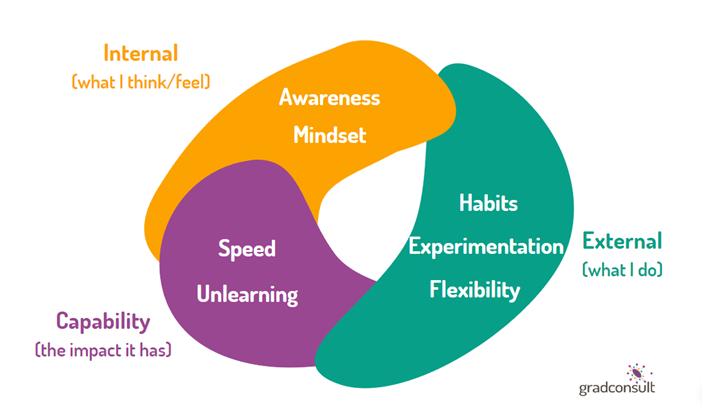Developing learning agility in early talent will help the successful transition to work, explains Rachel Salmon at Gradconsult.
The transition from education to employment is not an easy one. I remember the many challenges of adjusting (or failing to adjust!) to a very different world with very different ways of working.
Whilst in education, there are clear processes for ‘success’ which don’t leave much room for risk taking or learning from failure. The habits we form are about sticking to defined deadlines, holding on to what has worked in the past, striving for perfection and aiming for a fixed and clearly defined goal.
The behaviours and mindsets that have been reinforced whilst in education are often unhelpful when students move into employment.
They face a new set of challenges which don’t ‘fit’ with the way they have been taught or what has made them successful so far. There is much they need to learn, and unlearn, as they make the transition.
What do students need to adapt to the workplace?
As students enter the world of work, they need to learn to excel within the VUCA world in which we operate.
They have to juggle priorities, learn to be efficient (not perfect!), and cannot always be sure that they are getting it right.
Students also need to respond to rapidly changing external disruption, and harness the power of AI/machine learning as these technologies evolve and become more embedded in our work.
In a world then where agility is key to navigating the complexity of the current and future world of work, how can we set our early careers talent up for success?
Rebecca Fielding, Founder of Gradconsult explains: “In a world where information and knowledge are increasingly available, the ability to contextualise, interpret and take prompt action in response to this data becomes the key differentiator to individual and organisational performance.
“It’s has never been more true to say what got you here, will not get you there. Learning agility (LQ) therefore, rather than IQ or EQ, is rapidly becoming the key attribute for current and future success in the world of work.”
Learning agility
Learning agility is arguably where humans will have the competitive advantage over machines, and it is certainly crucial for early careers hires.
It’s what helps us to pivot and adapt to changing or ambiguous circumstances. It’s how innovation and problem solving is enabled. It’s the new foundation of development; the bedrock on which other skills and knowledge can be built.
At Gradconsult, we have developed a seven-factor model which breaks down the idea of learning agility into component parts.

Some of these parts might sound familiar, things like having a growth mindset and forming good learning habits, but some of the others might not be on your radar.
When we consider a world of rapid change, our ability to unlearn is as important as our ability to learn. It is about reflecting regularly on the knowledge and behaviours that are no longer helpful in our current context and practicing ‘organised abandonment’ of things that do not serve us well.
In ambiguous times, experimentation is what helps us move forwards. As we look for new ways to innovate this will involve trying new things, failing, learning, growing and trying again. It is important to have not only the space but the desire to experiment and learn.
When things are complex, flexibility in learning well help us to avoid getting stuck. If we can push ourselves to learn in different ways (both formal and informal) and step out of our learning comfort zone, many other possibilities will be opened to us.
As the pace of change increases, our speed in response and/or anticipation is also key. Picking up new trends, sector developments and insights quickly (and ahead of others) will give us competitive advantage. Seeking and responding to new behavioural insights or feedback quickly will enable us to adapt more effectively.
How to develop learning agility
How can you work with your early career talent to develop a more agile approach to learning? Here are some suggestions:
- Projects to encourage experimentation: Set up opportunities to allow your grads to bring their immense creativity into play to solve your knotty problems. Give them the freedom to get it wrong, right or somewhere in between!
- Increase self-awareness: If your grads are supported to understand themselves, their strengths, their learning preferences and their fears (e.g. about letting go of outdated strategies or ‘getting it wrong’), it will help them to step out and take a more agile approach.
- Stretch projects, challenges and competitions: Foster the behaviours that underpin learning agility in fun and creative way. What about the ‘Say yes more’ challenge? Or a horizon scanning and innovation competition?
- Peer to peer coaching and reflection opportunities: Creating space to share learning, unlearning, insights and challenges will encourage the change in approach that is needed.
- Masterclasses and insight talks: Hearing from leaders about how they approach their learning, what they have learnt from past failures, stepping out of their comfort zone and letting go of behaviours as the career, role or environment changed.
We have worked with and supported a number of clients who have started to do this. We are currently working with Vinted, designing and delivering their end-to-end grad programme, weaving learning agility throughout.
We have also delivered one-off learning activities such as innovation labs and growth mindset workshops. It is a pleasure to work with these clients as they lay ground works for a more agile, adaptable, and confident workforce.
Come along to our session at the ISE Development Conference in July to find out more about the seven factors of learning agility and how you can embed it within your development programmes. You will also hear from the wonderful IMI team about how learning agility has been adopted in their development approach.
You may also be interested in
Find out more and register for ISE Student Development Conference, 5 July 2023
Setting early talent up for success in a hybrid world
Reducing task switching improves productivity, wellbeing and creativity


0 Comments